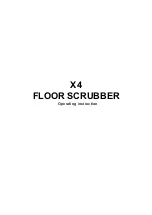
ASSEMBLING THE BRUSH HEAD BRUSH
To fit the brush on the brush head body, proceed as follows:
1. Take the machine to the maintenance area.
2. Make sure the machine has been secured (see the section titled “
CAUTION
: these operations must be carried out using protective gloves to avoid any possible contact with the edges or tips of metal objects.
3. Stand on the left side of the machine.
4. Remove the left splash guard (2), unscrew the knobs (3) on the brush head body (
Fig.1
).
5. With the brush head in the up position, insert the brush into the brush holder plate. Rotate the brush unit the brush's three buttons on the brush, grip with the notches in the brush plate.
6. Turn the brush in increments until the button is pushed towards the coupling spring and is locked in place (
Fig.2
).
7.
Carry out the operations just described for the right-hand front brush as well.
N.B.
: The image in
Fig.2
indicates the direction of rotation for coupling the left brush; the right brush must be turned in the opposite direction.
1
2
2
1
ASSEMBLING THE SQUEEGEE BODY
For packaging reasons, the squeegee body comes disassembled from the machine. In order to mount it on the squeegee support, do the following:
1. Make sure the machine has been secured (see the section titled “
”).
CAUTION
: these operations must be carried out using protective gloves to avoid any possible contact with the edges or tips of metal objects.
2.
Unscrew the knobs (1) in the squeegee body pre-assembly (
Fig.1
).
3. First, insert the left pin (2) on the squeegee body into the left slit (3) in the squeegee support (
Fig.2
), so that the bushing adheres to the walls of the slit in the squeegee support.
4. Repeat the same operation for the right pin.
5. Insert the vacuum tube (4) in the sleeve (5) in the squeegee body (
Fig.3
).
N.B.
ADJUSTING THE SQUEEGEE BODY'S RUBBER BLADES
1
2
3
5
4
1
3
2
PREPARING TO WORK
Before beginning to work, it is necessary to:
1. Make sure the recovery tank is empty. If this is not the case, empty it (read “
”).
2.
Check that the amount of detergent solution present in the solution tank is sufficient for the type of work to be performed. If this is not the case, top up the solution tank (see the sections titled “
”).
3. Check that the squeegee rubbers are in good working condition. If not, carry out maintenance (see “
REPLACING THE SQUEEGEE BODY RUBBER BLADES
4. Check that the condition of the brushes is suitable for the work to be carried out; if not, carry out the necessary maintenance (read the paragraphs concerning the assembly of the brushes or of the abrasive
pad).
5.
Check that the main switch is set to “0", turn the key (1) a quarter turn anti-clockwise (
Fig.1
) . With the machine off, remove the key from the instrument panel.
6. Press the recovery tank release lever (2) and turn the recovery tank into the maintenance position (
Fig. 2
).
CAUTION:
the following operations must be carried out by qualified personnel. An incorrect connection of the connector may cause problems with machine functioning.
7. Connect the battery connector from the main machine system connector (
Fig.3
).
8. Rotate the recovery tank into the working position (
Fig.4
). Make sure that the recovery tank retainer system is correctly engaged.
9.
Move to the right rear part of the machine and check that the electro-brake, present in the traction gear motor, is not engaged. Turn the lever (3) clockwise (
Fig.5
).
10.
Move to the front of the machine and check that the water system filter cap (4) is closed, otherwise tighten it (
Fig.6
).
11.
Move to the front left-side of the machine and check that the water tap is fully open, move the water adjustment knob (5) in the direction shown by the arrow (
Fig.7
).
12. Move to the rear of the machine a check that the cap of the recovery tank drainage tube (6) is closed. If it isn't, close it (
Fig.8
).
13. Make sure the vacuum tube (7) is correctly connected to the sleeve in the squeegee body. If it isn't, connect it (
Fig.9
).
14. Remove the recovery tank cover (8) (
Fig.10
).
15.
Remove the floating guard (9) by turning it clockwise (
Fig.11
). Make sure the filter-float (10) is correctly connected and is clean, if not, clean it (see “
CLEANING THE RECOVERY TANK FILTERS
16.
Make sure the filter-strainer (11) is correctly connected and is clean (
Fig.12
). If it isn't, clean it (see “
CLEANING THE RECOVERY TANK FILTERS
”).
6
4
5
3
1
1
4
2
3
2
9
7
12
11
11
9
10
7
5
10
8
6
8
15
Summary of Contents for TRIDENT R26SC PRO
Page 2: ......
Page 3: ...ENGLISH 4 ESPA OLA 30 FRAN AIS 56 3 ESPA OLA FRAN AIS ENGLISH...
Page 82: ...ESPA OLA FRAN AIS ENGLISH 82...
Page 83: ......
















































